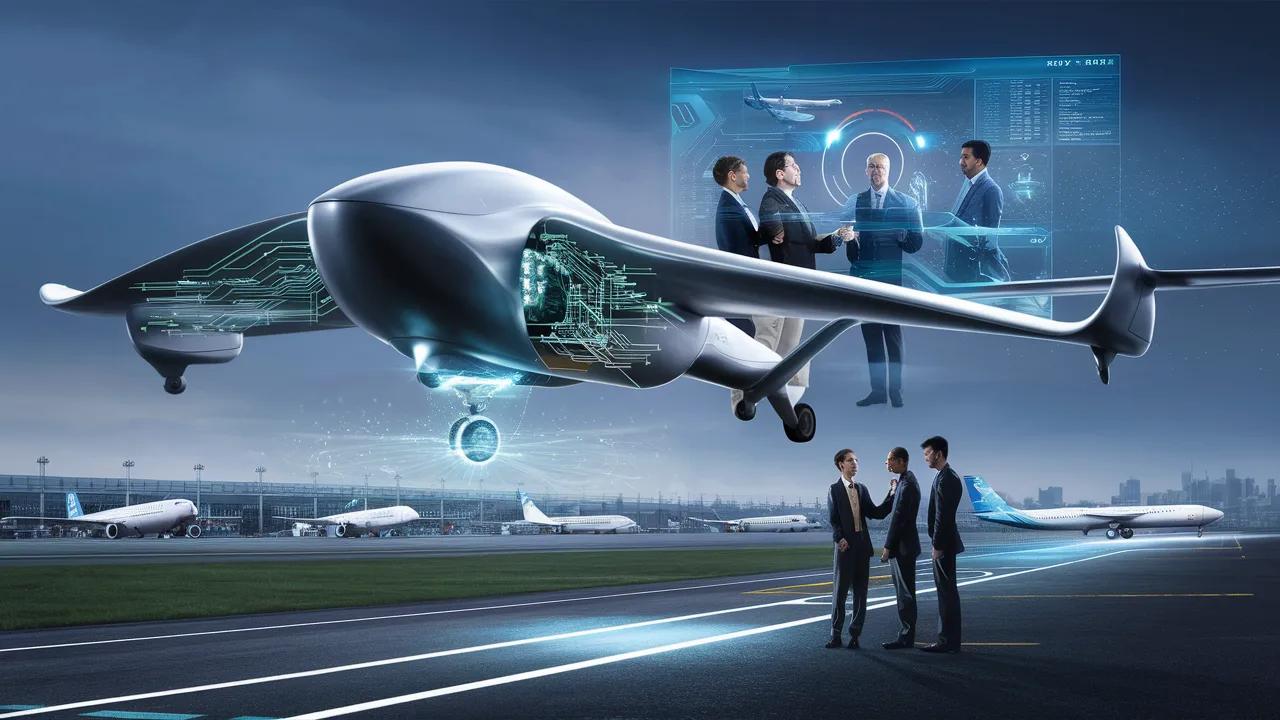May 30, 2024|6 min reading
The Rise of Artificial Intelligence in Aviation: Transforming the Skies

The aviation industry is undergoing a profound transformation, driven by the integration of artificial intelligence (AI). From optimizing flight routes to enhancing passenger experiences, AI is revolutionizing various facets of air travel. As the global artificial intelligence in aviation market continues to expand, reaching an estimated value of USD 23 billion by 2031, it's evident that AI is reshaping the future of aviation.
The Main Applications of AI in the Airline Industry
Let’s delve into the diverse applications of AI within the airline industry and understand how it's reshaping operations:
Revenue Management
AI algorithms are revolutionizing revenue management by analyzing vast datasets to predict demand and dynamically adjust ticket prices. Delta Airlines, for instance, utilizes AI-powered systems to optimize fares based on historical data and customer preferences, thereby maximizing revenue.
Air Safety and Airplane Maintenance
By harnessing AI capabilities, the aviation industry can enhance air safety through predictive maintenance solutions. General Electric’s "Predix" system exemplifies this, enabling real-time monitoring of aircraft components and proactive maintenance, leading to improved safety standards and operational efficiency.
Feedback Analysis
AI-driven sentiment analysis tools empower airlines to extract valuable insights from customer feedback, enabling them to address issues promptly and enhance service quality continuously.
Messaging Automation
Messaging automation, facilitated by AI-powered chatbots like KLM Royal Dutch Airlines’ "BlueBot," streamlines customer service by providing real-time assistance and updates, enhancing overall passenger experiences.
Crew Management
AI facilitates more reliable crew scheduling, reducing delays and enhancing safety by ensuring the availability of skilled crew members for each flight.
Fuel Efficiency Optimization
AI algorithms optimize fuel consumption by analyzing factors such as weather conditions and flight routes, as demonstrated by AirAsia’s "OptiClimb" solution, resulting in significant fuel savings per flight.
Selling Tickets
AI-driven recommendation engines personalize ticket recommendations based on individual preferences, simplifying the booking process and enhancing customer satisfaction.
In-Flight Sales and Food Supply
AI enables airlines to personalize in-flight meals and reduce catering waste through programs like Airbus’ "Food Scanner," ultimately improving the overall travel experience.
Fraud Detection
AI algorithms swiftly detect fraudulent activities in travel bookings, enhancing security and minimizing risks associated with fraudulent transactions.
AI at the Airport: Innovation on the Ground
AI technologies are not only transforming air travel but also revolutionizing ground operations at airports:
Enhanced Security
Biometric authentication and facial recognition technologies enhance security measures and streamline passenger verification processes, contributing to a safer and more efficient travel experience.
Logistics and Operations
Automated check-in systems and AI-powered luggage-handling solutions improve operational efficiency and minimize errors in baggage handling, ensuring a seamless airport experience for passengers.
Customer Service
AI-driven virtual assistants and chatbots enhance customer service by providing real-time assistance and personalized recommendations, enhancing overall passenger satisfaction.
The Future of AI in Aviation
While AI will not replace pilots, it will play a crucial role in shaping the future of aviation, particularly in predictive pricing, sustainable flights, better aircraft health systems, and optimized flight routes.
Challenges and Risks of AI in Aviation
Despite its numerous benefits, the adoption of AI in aviation poses challenges such as technical hurdles, ethical considerations, workforce challenges, and regulatory complexities.
Case Studies of AI in Aircraft Maintenance
Real-life examples from Delta Airline and Southwest Airlines highlight the tangible benefits of AI in aircraft maintenance, from biometric authentication to sentiment analysis and fuel efficiency optimization.
Future of AI in Aircraft Maintenance
Predictive maintenance and inventory management powered by AI are poised to revolutionize aircraft maintenance operations, optimizing costs and enhancing safety.
Conclusion
The integration of artificial intelligence in aviation is no longer a choice but a necessity. As technology continues to advance, AI will drive further transformative changes in the aviation industry, enhancing safety, efficiency, and passenger experiences.
FAQs
How is artificial intelligence used in aviation?
What is the future of aviation with AI?
How is AI used in airports?
Will AI take over airlines?
In conclusion, the rise of artificial intelligence in aviation signifies a new era of innovation and transformation in air travel, promising safer, more efficient, and personalized experiences for passengers worldwide.
Explore more

Unleashing the Power of Build with Claude: How Claude 3.5 Sonnet Revolutionizes Computer Interaction
Discover the potential of Claude 3.5 Sonnet's desktop automation and computer use tools for enhanced productivity.

Create a PowerPoint Presentation from Text with Aidoc Maker: Simplify Your Presentation Process
Simplify PowerPoint creation! Learn how Aidoc Maker turns text into professional presentations with customizable designs...

Revolutionize Your Frontend Development with V0: The AI-Powered Tool for Generating Tailwind CSS Components
Revolutionize frontend development with V0, an AI tool that generates reusable Tailwind CSS components, speeding up your...
